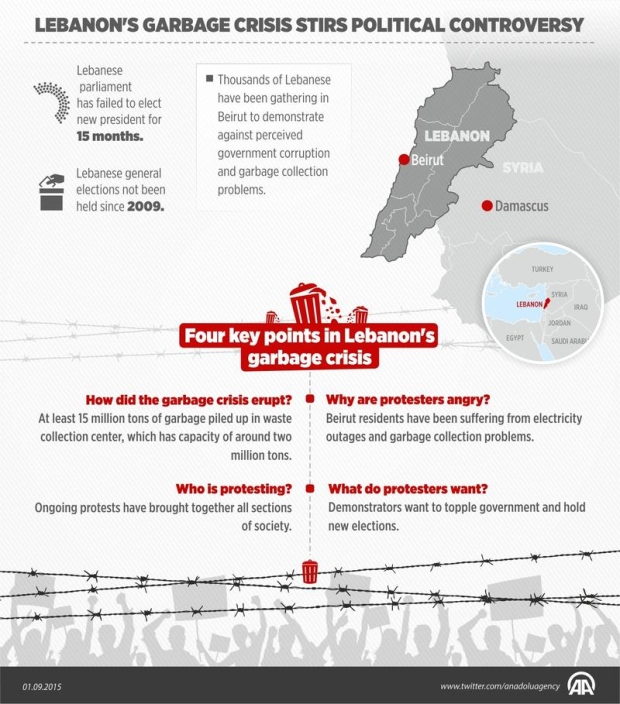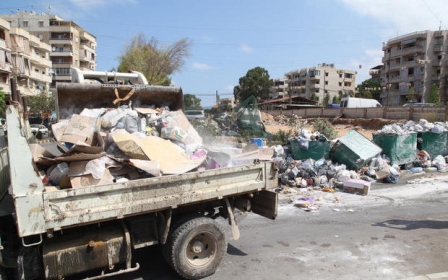Lebanon government powerless as protests escalate

Lebanon's divided government appeared powerless on Wednesday to address a growing protest campaign that began over a rubbish crisis and escalated with activists occupying the Environment Ministry.
On Tuesday night, police forcibly evicted several dozen protesters who had occupied part of the ministry in a surprise bid to force the minister's resignation.
The protest was an escalation of the "You Stink" campaign, which started over a rubbish collection crisis but has become a movement targeting Lebanon's stagnant and corrupt political class.
In a sign of the government's ongoing impotence, the parliament on Wednesday failed for the 28th time to elect a new president.
The post has been empty since May 2014, but the legislature is so politically divided that every attempt to elect a replacement has failed.
Following the parliament's failure to elect a president on Wednesday the UN Security Council called on the Lebanese government to get its act together.
After hearing a report from UN envoy Sigrid Kaag, the 15-member council expressed support for the government, Russian Ambassador Vitaly Churkin told reporters.
Council members called on the parliament "to meet and elect a president as soon as possible in order to put an end to the constitutional instability," said Churkin, whose country holds this month's presidency of the council.
The presidential void is just one example of the government paralysis that has increasingly been the target of the "You Stink" campaign.
Its demands have expanded beyond a solution to the waste crisis to calls for the environment minister's resignation, new parliamentary elections and accountability for violence against protesters.
On Wednesday, "You Stink" activist Assaad Thebian said the campaign would continue after the environment ministry sit-in, which lasted eight hours before being broken up by police.
"It seems that the government is persisting in ignoring the demands of the Lebanese people," he said.
"The leaders are in a state of political bankruptcy, incapable of taking any decision."
'No storm in a teacup'
Thebian defended the ministry sit-in, despite its failure to oust Environment Minister Mohamed Mashnuq.
"We didn't force the minister to resign, but we took the movement up a notch," he said.
"We also forced the minister to stay in his office for eight hours, which is rare for him!"
Lebanon's As-Safir newspaper said the sit-in had showed that the protest movement had staying power.
"Beyond the debate on the principle of whether the sit-in was right or not, what is most important is that this uprising has proved it is no storm in a teacup," the newspaper wrote.
"You Stink" is expected to announce its next steps on Wednesday night, and another protest group has already called a new demonstration in downtown Beirut for 6pm (1500GMT).
Thebian said "You Stink" would also be calling for protesters in different parts of Lebanon to mobilise in support of the campaign.
Analysts said the campaign was putting significant pressure on the government.
"Now the government and the political class know that they're under scrutiny," said Sahar Atrache, a senior analyst at the International Crisis Group.
"This is a very good change because before they felt like they could do anything and the Lebanese would let them."
Government must 'face facts'
But she cautioned that the protest movement risked petering out if it did not focus its attention on achievable demands that would avoid polarising public opinion.
"People won't stay in the streets forever. If this movement one week after another is not really able to come up with clear objectives and concrete achievements, it's going to taper off with time."
She said the movement had garnered broad-based support by focusing on issues like power cuts and crumbling infrastructure, which cut across Lebanon's sectarian and political divides.
By targeting individual politicians, it risks falling "into the trap of divisive issues and polarisation," Atrache warned.
Maha Yahya, a senior associate at the Carnegie Middle East Centre think tank, said Lebanon's government must act fast.
"It needs to take seriously that this is not only about garbage, it's about governance," she told AFP.
"There are ways that they can move quickly on the environmental portfolio issue - like with clear transparent bids (for trash collection)."
Later on Wednesday, Interior Minister Nuhad Mashnuq is set to announce the results of an investigation into violence against protesters at the first major "You Stink" rally nearly two weeks ago.
The violence galvanised public opinion and Yahya said police accountability would be necessary to calm widespread disquiet.
But she questioned whether the government was taking the protest movement seriously.
"They simply don't want to face the facts that this is a genuine movement of people who have had enough."
Middle East Eye propose une couverture et une analyse indépendantes et incomparables du Moyen-Orient, de l’Afrique du Nord et d’autres régions du monde. Pour en savoir plus sur la reprise de ce contenu et les frais qui s’appliquent, veuillez remplir ce formulaire [en anglais]. Pour en savoir plus sur MEE, cliquez ici [en anglais].





